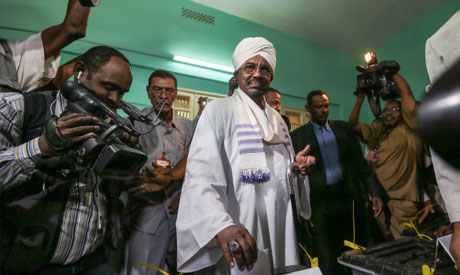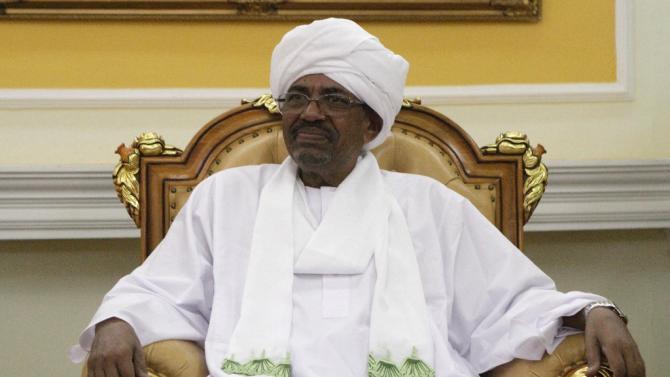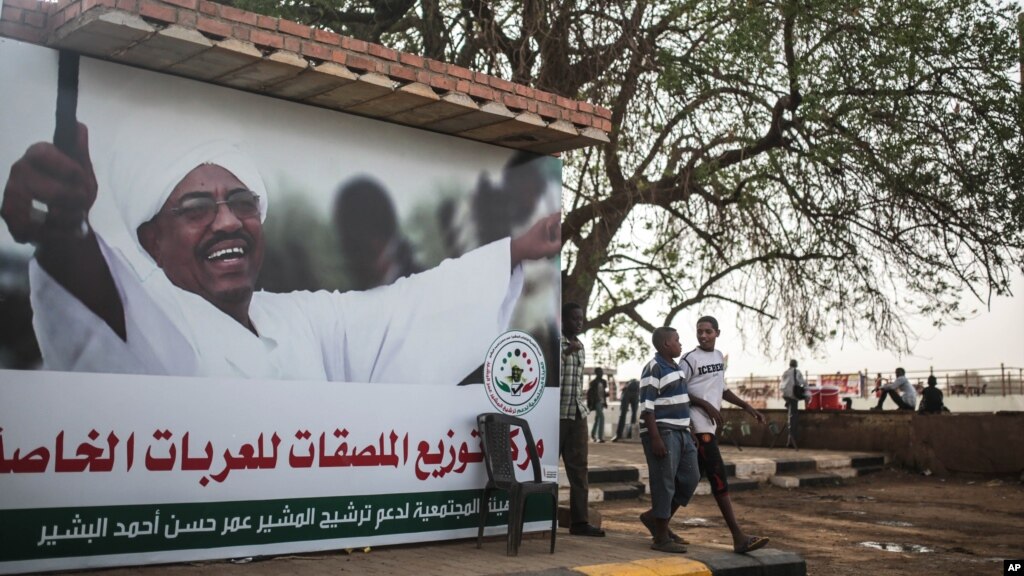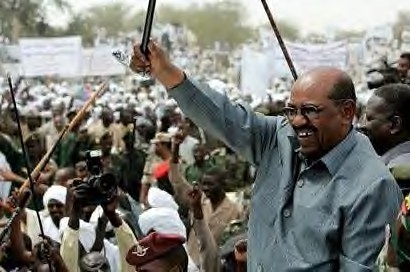
President Omar al-Bashir casts his ballot as he runs for another term, on the first day of the presidential and legislative elections, in Khartoum, Sudan, Monday, April 13, 2015
Battling division and government repression, Sudan's opposition has launched a sit-in against elections expected to extend President Omar al-Bashir's rule, but it has been met with almost as much indifference as the vote itself.

Only about 80 people gathered at the headquarters of the country's oldest political party, the Umma, in Khartoum's twin city of Omdurman as night fell on the first day of the elections on Monday.
"What you see now is a number we didn't expect," said Hassan Imam Hassan, the Umma's acting secretary general, saying he had hoped for a better turnout.

Behind him, mostly elderly opposition figures sat in the garden of the elegant colonial-era villa, listening to speeches denouncing Bashir and the three-day vote for the presidency and state and national parliaments.
"These elections will lead to nothing. It is a worthless election, false and they cost a lot," Hassan said, dressed in traditional Sudanese robes.

The Umma and other parties, rebels and civil society groups came together in December to form the alliance, calling on Bashir to stand down and for the elections to be postponed.
They say Bashir -- indicted by the International Criminal Court over alleged war crimes in Darfur -- has run the country into the ground.
Sudan Call plans to hold the sit-in at least until results are announced in late April.
With Bashir facing 15 little-known opponents for the top job, there is little doubt he will extend his 25-year rule over the country.
But Sudan Call has still faced intense pressure from the security forces, hindering its work.
"The opposition is working under conditions that prevent parties from talking to the people," said Amal Jabrallah Sidahmed, a top official in the Communist Party, also part of Sudan Call.
Two signatories to the agreement were detained in December as they returned from Addis Ababa, where they joined the group, and only released last Thursday.

Last year Umma Party head Sadiq al-Mahdi and his daughter Maryam were detained on separate charges for a month each.
Sadiq was Sudan's last democratically elected prime minister, ousted in the 1989 coup that swept Bashir to power.
Sudan Call has urged the formation of a transitional government before elections be held, saying it intends to use peaceful means to spread its message.

"Young people prefer going out in the streets but we know that if we open the way before them it would lead us to a situation like in Syria," Sidahmed said.
In September 2013, security forces cracked down on protests over price rises, killing dozens of demonstrators.
"We are eager for a peaceful solution," Sidahmed added.

Sudan Call has struggled to get its message out ahead of the elections.
The print and broadcast media in Sudan have come under intense scrutiny from the NISS security service, which arbitrarily confiscates print runs of newspapers it deems to have published inappropriate material.
"The security services really manage the newspapers," said Amal Hebari, a journalist and activist at the sit-in.

But the opposition has problems of its own, having long battled internal divisions over how to face up to Bashir's government.
The Umma has splintered many times under Bashir, with some of its offshoots now allied to the president.
Despite being one of the broadest opposition alliances in recent years, differences between Sudan Call's signatories have already emerged.

Some rebels who signed the document have vowed to disrupt voting in South Kordofan, Blue Nile and Darfur by force but other members of the group have distanced themselves from military action.
Coupled with memories of the opposition's turbulent last time in government, this has given the myriad opposition groups limited traction with the public.
As the vote entered its second day on Khartoum's dusty streets, taxi driver Sayid al-Hamed Ahmed was unmoved by the opposition campaign.
"I voted but we didn't see anything from the opposition, it's not really working," the septuagenarian said.
Many Sudanese of his age remember Mahdi's last term in power from 1986 to 1989 as one of political bickering in parliament, poor administration and an escalating civil war against southern rebels.
"Comparing Sadiq's government and today, we didn't use to have everything we need,"he said.
"Now you can find everything despite the crises that we are facing".